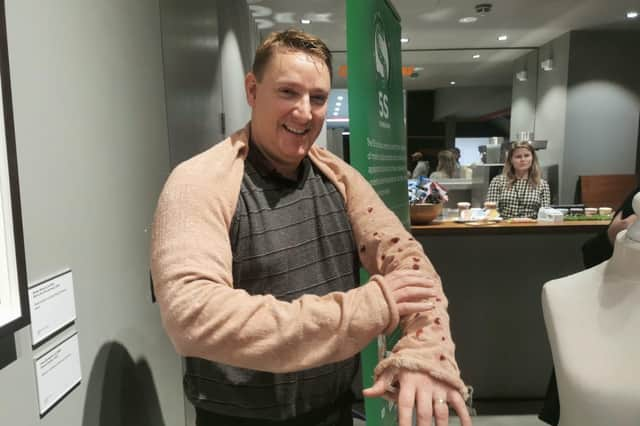"A neglected infectious disease that still affects our town" - Eastbourne film event


The event, run by Brighton and Sussex Medical School, was about the experiences of scabies in care homes in coastal towns and in communities in Ethiopia.
Spokeswoman Esther Garibay said: “The lights went off at the Towner cinema. First on-screen the experimental mini-opera Within a Forest Dark. Diana, a retired schoolteacher with advanced stage dementia who has just moved into a care home like the many local to us. She sings, distressed and confused, trying to express her intolerable itching as we see her family members struggle to understand.
Advertisement
Hide AdAdvertisement
Hide Ad“Second on-screen we hear from Belsti, Merhatsedik and Hailemariam, three individuals living in Gojjam, Ethiopia that describe a similar agony, a constant itch that overwhelms them in the night, talking straight to the camera in documentary style.
“Two completely different settings and film genres, one same reason for the itch described: a tiny burrowing mite called Sarcoptes scabiei, the cause of scabies. The mites make tunnels in your skin and cause burrows, small bumps and severe itching.
“Scabies spreads easily from person to person, mostly skin to skin. So, it especially spreads among people who live close together. This explains why the living conditions of the people portrayed in the films meant they were more vulnerable to scabies.”
Professor Jackie Cassell, Deputy Dean of Brighton and Sussex Medical School (BSMS), said: “Scabies is treatable, but hard to get rid of. “When I started working on scabies outbreaks in care homes some of my colleagues thought it was a weird, marginal interest. Now with Covid1-9 everyone is realising this and other infections are a big deal in care homes for older people, many of whom are near the end of life”.
Advertisement
Hide AdAdvertisement
Hide AdJo Middleton, a disease ecologist at BSMS, added “Here at BSMS we studied the scabies outbreaks in local care homes for older adults and showed it usually takes a long time for staff to realise an outbreak is happening. This may be because it is harder to recognise in people with dementia, in particular. We also showed what a difficult experience this is for homes, and the support they need in early recognition and rapid treatment.”
He continued: “Scabies at the Manston Migrant Reception Centre is in the news at the moment, but is not at all surprising. Research done by a BSMS student shows that scabies is extremely common and hard to control in migrant and refugee accommodation across Europe, due to the living conditions.”
Esther added: “Scabies is defined by the World Health Organisation as a Neglected Tropical Disease But while it is much common in resource poor settings, largely in the Global South, it affects vulnerable populations everywhere in the world.
“The second film shown at the Towner was “The agony of the night”, a documentary by independent Ethiopian filmmaker Eyerusalem Kassahun from the 5S Foundation captures several testimonies from people affected by this condition and the health workers treating them.”
Advertisement
Hide AdAdvertisement
Hide AdAderau Gete, a district nurse interviewed for the film, said: “Scabies if often thought of as a poor person’s disease and there is a lot of stigma for people that suffer with it, particularly when it is visible to other people. Like the story of a student in year 12, when I asked him Why do you wear gloves? He said it is because the discrimination from other people was hurting him more than the disease. The terms used to describe people who experience scabies are highly derogatory. More than that, I feel ashamed of myself, I don’t want to play with my friends.”
Dereje Wonde, a PhD researcher from BSMS and lecturer of sociology at Bahir Dar University in Ehtiopia, has been doing ethnographic work to explore scabies incidence and management in rural communities, including among the religious students potrayed in the documentary. He was present at the Towner to introduced the documentary and answer audience questions, including one around why this disease continues to be so prevalent despite the availability of treatment. To which he replied:
“In 2015-2016 Ethiopia experienced a series of scabies outbreaks due to effects of climate change and draught. The lack of access to water and sanitation facilities exacerbates the conditions in which scabies thrives. I see my role as a researcher is to facilitate people narrating their experience. And then making sense of what I am finding to help understand why and how certain populations are being particularly affected by the outbreaks, in this case religious students in the Gojjam district.”
Gem Aellah, Research Fellow at BSMS and Eastbourne resident who convened the event, opened the evening by explaining the event was part of the Economic and Social Research Council (ESRC) Festival of Social Science under the theme “My local place”, focusing on a topic that is of high relevance to Costal Towns, like Eastbourne, that has recently experienced localized outbreaks of scabies, and allowing participants to contrast it to another setting, in this case Ethiopia.